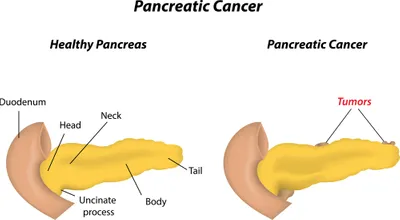Pancreatic cancer is one of the few types of cancer that haven’t improved in terms of survival rates over the years, according to the Hirshberg Foundation for Pancreatic Cancer Research. In fact, the foundation said the mortality rate is 93-percent within 5-years of diagnosis. And 71-percent will die in first year.
These stats point to why it’s important to raise awareness about this killer cancer, and to outline some facts and figures. In honor of Pancreatic Cancer Awareness Month in November, here are six things to know…
1. There are Risk Factors
The American Cancer Society says that the average lifetime risk of developing cancer of the pancreas in both men and women is 1 in 65. However, there are certain factors that might make you more likely to face the disease.
Cancer Treatment Centers of America notes that these risk factors include age (most pancreatic cancers form at age-55 or older), gender (males are slightly more likely to develop it), obesity, diabetes, smoking, and more.
2. Some Cases Could be Genetic
Cancer Treatment Centers of America also notes that about 10-percent of pancreatic cancer cases are thought to be genetic, or passed down from a parent.
These genetic mutations include hereditary breast and ovarian cancer syndrome (BRCA2), familial melanoma (p16), familial pancreatitis (PRSS1), and neurofibromatosis type-1 (NF1), adds the source. Other “inherited syndromes” can raise risks including Lynch syndrome (hereditary nonpolyposis colorectal cancer), Peutz-Jeghers Syndrome, and Von Hippel-Lindau Syndrome.
3. There Were 50,000 New Cases This Year
The American Cancer Society estimates there were 53,070 new diagnoses of pancreatic cancer this year in the U.S., and sadly it adds that it expected more than 41,000 of those patients to die from it.
Of those numbers, there were an estimated 27,670 men diagnosed in 2016, compared to an estimated 25,400 diagnoses for women. The death rates are proportionate for both, according to additional statistics from the cancer society.
4. It’s One of the Most Prevalent Cancers in the World
The World Cancer Research Fund International notes that pancreatic cancer shares 10th-place in global prevalence with kidney cancer. Worldwide, there were 338,000 cases of pancreatic cancers diagnosed in 2012 alone, notes the source.
Looking at a breakdown of the disease’s age-standardized rates by country, the U.S. comes in 20th at 7.5-cases per 100,000. The top two countries in the world for cancer of the pancreas are Czech Republic (9.7-per 100,000) and Slovakia (9.4-per 100,000).
5. It Often Causes Symptoms When it’s Too Late
Scientific American talks about why this type of cancer is so deadly in a 2011 article making reference to Apple founder Steve Jobs, who died from the cancer.
It notes that patients sometimes don’t seek treatment right away, because symptoms including weight loss, jaundice and abdominal pain don’t begin until the later stages. “They usually start after the tumor is a significant size. By then, chances are, it has metastasized (that is, spread to other parts of the body),” explains the article.
6. There’s More than One Type
The American Cancer Society explains the overwhelmingly common form of this cancer is pancreatic adenocarcinoma, which makes up 95-percent of all cases. These begin in the ducts of the pancreas and sometimes develop from the cells that form pancreatic enzymes, according to the source.
The “other” type of cancer of the pancreas is pancreatic endocrine tumors, otherwise known as neuroendocrine tumors, explains the cancer society. These tumors can be cancerous or benign, and are subdivided into other categories including “functioning NETs” (including gastrinomas, insulinomas and glucagonomas), and “non-functioning NETs” which are actually more likely to cause cancer because they can grow larger before they’re discovered.









